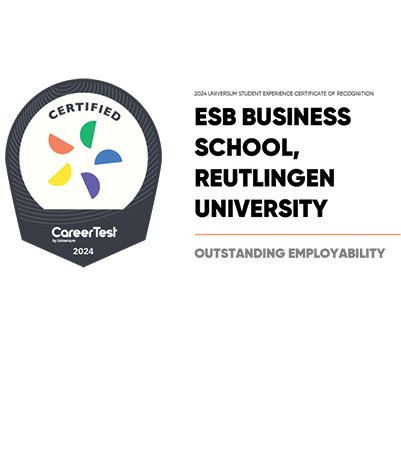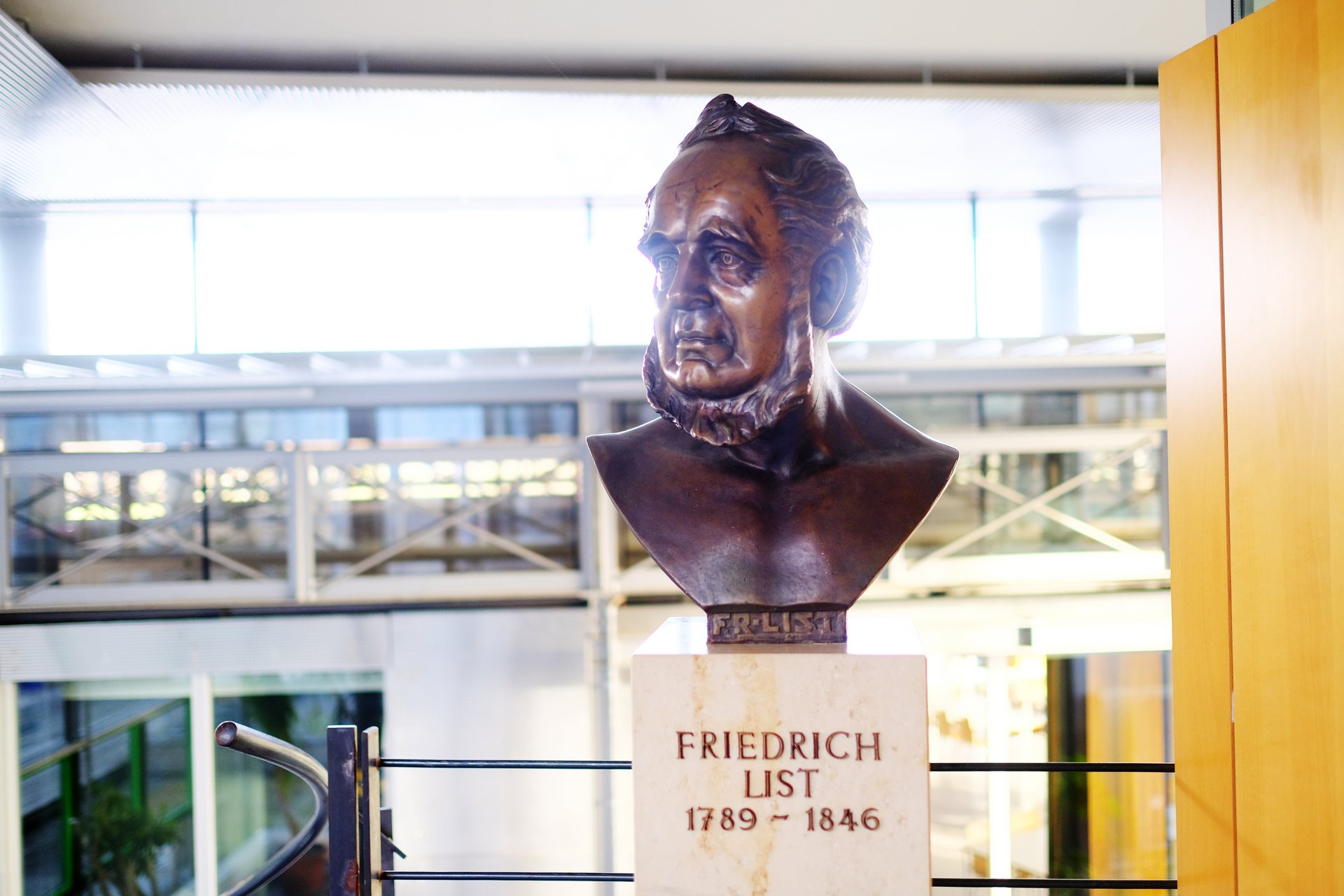
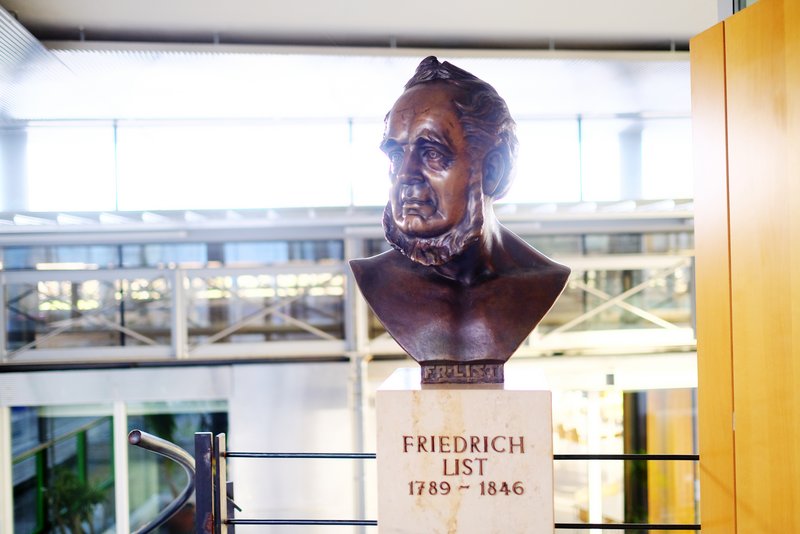
Friedrich List Institute for Historical and Contemporary Economic Studies (FLI)
The Friedrich List Institute for Historical and Contemporary Economic Studies (FLI)) is an institution of Reutlingen University, ESB Business School.
Major research areas
The objectives of the Friedrich List Institute for historical and contemporary economic studies (FLI) are
- Research into the economic and political ideas of Friedrich List and List’s biography
- Dissemination of the ideas of the ‘ingenious and much misunderstood’ economist at home and abroad
- Studies on the transformation of List’s ideas to current problems
- Current economic studies with an affinity to List’s construct of ideas
- Exchange with other scientists at home and abroad

The origins of the Friedrich List Institute
On 4th May 1992, the Ministry of Science and Art of Baden-Württemberg gave the green light for the founding of the ‘Friedrich List Institute for Historical and Contemporary Economic Studies (FLI)’. It was established as a research institute at the Reutlingen University of Applied Sciences.
History of the institute
After Professor Dr Eugen Wendler had already started research into List at the Reutlingen University of Applied Sciences in 1972 and had numerous publications to his name, he decided to found an institute. With this institute, he wished to emphasise the seriousness of his tireless efforts and achieve appropriate attention and recognition.
On 4th May 1992, the Ministry of Science and Art of Baden-Württemberg gave the green light for the founding of the ‘Friedrich List Institute for Historical and Contemporary Economic Studies (FLI)’, which was established as a research institute at the Reutlingen University of Applied Sciences. However, it was ‘expressly pointed out that the operation of the institute is to be financed exclusively from third-party and project funds.’ This has not changed to this day. The Friedrich List Institute for Historical and Economic Studies (FLI) is the first and only officially authorised institute at Reutlingen University that is linked to a chair. From the very beginning, the aim was to enrich research on List with new findings, to disseminate his ideas in academia, to draw attention to their relevance to the present and to stimulate current research based on List’s ingenious body of thought.
Even after his retirement in 2004, Professor Dr Eugen Wendler continued to lead the FLI until 2012. For this he was honoured with the Federal Cross of Merit and the Medals of Merit of the University and City of Reutlingen.
In 2012, Eugen Wendler transferred the FLI to his active ESB colleague, Professor Dr Stephan Seiter. This not only led to a close friendship, but also to a rewarding collaboration. In particular, Stephan Seiter organised the international symposium at Reutlingen University to mark the 225th anniversary of Friedrich List’s birth, was responsible for the translation of the papers presented at the symposium and, together with Professor Dr Harald Hagemann from the University of Hohenheim, published the collection with a renowned New York publishing house. Professor Dr Stephan Seiter headed the FLI until he became an FDP member of the German Federal Parliament in autumn 2022.
Since 2023, Professor Dr Larissa Zierow has headed the Friedrich List Institute for Historical and Contemporary Economic Studies (FLI). Her aim is not only to further advance historical research on Friedrich List but also to promote current economic issues in the spirit of Friedrich List. These take up elements – such as the social market economy or international trade – from Friedrich List’s ideas in a new context or are related to his work.
The life and work of Friedrich List
The merits of Friedrich List relate to his work as a politician, scientist, journalist, entrepreneur and railway pioneer.

- Constitutional opinions and other important expert reports, in particular on the reform in administrative practice and the whole problem of emigration
- Petition to the Federal Assembly for the abolition of customs barriers within Germany
- Initiator and counsel to the Trade and Industry Association
- Proposals to promote the economic development of Württemberg and the political unification of German territorial states
- Efforts to forge a political alliance between Great Britain and a unified Germany
- Visionary ideas on an economically and politically integrated core Europe
- Consul of the United States for the Kingdom of Saxony.
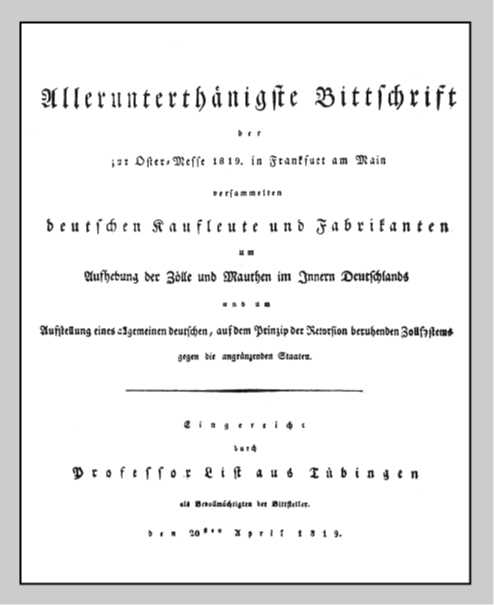
- Initiative for the founding of the Faculty of Political Economy at the University of Tübingen, the oldest continuously existing faculty of economics in Germany
- Intellectual author of the Staatslexikon (state encyclopaedia) – the ‘bible of the liberals’ during the Vormärz (pre-March period between 1815 and 1848)
- Author of important writing on trade policy (Outlines of American Political Economy; Le système naturel d`économie politique – The Natural System of Political Economy; Le monde marche – The World is Moving)
- Author of his major work: ‘Das nationale System der Politischen Ökonomie’ (The National System of Political Economy), the first German classic of national economics
- Differentiation between the ‘theory of values’ and the ’theory of productive forces"
- Recognition of intellectual labour and education as a productive force
- Differentiation between economics and business administration
- First German transport economist
- Proponent of the ‘infant industry theory’
- Pioneer of the social market economy
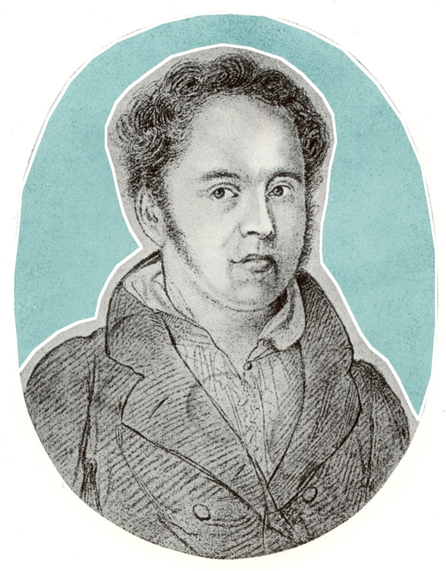
- Tireless publicist
- Author of approx. 700 essays in German and foreign newspapers
- Editor, sole editor and co-publisher of approx. 10 German and foreign newspapers
- First German business journalist
- Founded one of the first German popular magazines (illustrated)

- Discovery of a large coal deposit in Pennsylvania
- Co-initiator of the construction of one of the first steam-powered railway lines in the USA to tap coal deposits
- Creation of the first railway map with the main lines of the German railway network
- Initiator and campaigner in the planning and construction of the Saxon Railway Leipzig-Dresden, the first long-distance railway in Germany
- Diverse activities for the construction of other German railway connections, in particular the Baden and Thuringian railways.
![[Translate to English:] [Translate to English:]](/fileadmin/_processed_/9/5/csm_Zierow_Larissa_2_2023_06_14_8f1341a495.jpg)








